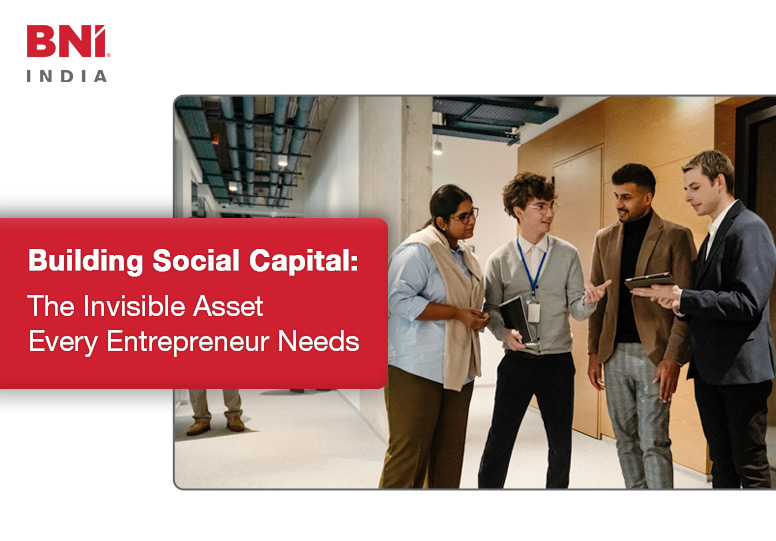Think about the most successful entrepreneurs you know. Chances are that their achievements aren’t built on just brilliant ideas or flawless execution. More than anything else, their conversations revolve around this integral part of their wealth. While most entrepreneurs begin by investing money, time, and effort in their business, they become truly successful by investing time in building their social circle. This helps them direct their efforts toward connecting with the right people and eventually experience the luxury of this powerful asset. Welcome to the world of building social capital, the invisible asset every entrepreneur needs.
Social Capital: The Wealth You Can’t See but Always Feel
At its core, social capital is about relationships, trust, and credibility. And these are not quick wins. It’s building a network that keeps giving back, in terms of money and relationships. While financial capital and human capital are visible and measurable, social capital works quietly in the background, opening doors you didn’t even know existed.
Think of it as your reputation, multiplied by the strength of the community around you. The stronger your network, the greater your chances of growth.
The Power of Diversity in Your Network
One of the most overlooked aspects of social capital is the diversity of connections. Entrepreneurs who connect beyond their immediate circle, across industries, regions, and even cultures, gain access to new perspectives, opportunities, and collaborations.
When you step into a room full of people from different backgrounds, you’re pushed into an ocean of human insights that can reshape your business strategy. From cultural nuances to industry-specific trends, diverse connections are the fuel that keeps innovation alive.
Trust as the Foundation of Business Relationships
Relationships without trust are like bridges without foundations. They may look impressive, but they won’t hold for long. For trust to flourish, there has to be an environment where social norms are upheld, reciprocation is valued, and promises are kept.
In practical terms, this means showing up when you say you will, honouring commitments, and putting the other person’s interests at heart. Over time, trust compounds into credibility, and credibility into influence. And in the entrepreneurial world, influence is a form of currency that money simply can’t buy. It’s not easy but it’s all worth the efforts.
Beyond Boundaries: Networking in a Global World
Today, entrepreneurs don’t just operate in local markets, they play on a global stage. This makes cultural intelligence a vital part of social capital.
Networking that goes beyond cultural boundaries, deepens your understanding of how people think, work, and build trust differently. An entrepreneur with cultural intelligence doesn’t just survive in global markets, they thrive because they can connect authentically across contexts. The knowledge about subtle cultural aspects helps them stand out and wanted.
This is why structured networks like BNI, thrive because they bring together professionals from diverse industries, regions, and cultures into one trusted ecosystem.
Why Social Capital Outweighs Quick Wins
Short-term wins might get you immediate results, but they don’t build resilience. Social capital, on the other hand, builds long-term stability. It means when challenges hit, you won’t face them alone. You’ll have a community ready to support, guide, and refer you.
For entrepreneurs, this invisible asset often makes the difference between simply running a business and scaling it into something extraordinary. Invest in people, nurture relationships, and build credibility and watch the returns follow naturally.
FAQs
1. What is social capital in business?
Social capital refers to the value entrepreneurs derive from their networks, relationships, trust, and credibility. It’s the unseen advantage that comes from being part of a trusted community.
2. Why should entrepreneurs invest in social capital?
Because social capital compounds over time. It creates opportunities, builds trust, and ensures long-term growth, rather than short-term wins.
3. How does networking build social capital?
Networking connects entrepreneurs with people from diverse industries and backgrounds, creating opportunities to collaborate, share knowledge, and build trust.
4. Can social capital help in global business growth?
Yes. Cultural intelligence, paired with strong relationships, allows entrepreneurs to connect across cultural boundaries and thrive in international markets.
Want to experience this firsthand? Visit a BNI chapter near you and see how the power of social capital transforms business connections.
